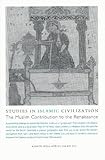Studies in Islamic civilization : the Muslim contribution to the Renaissance / Ahmed Essa with Othman Ali. [print]
Material type: TextPublication details: Herndon, Virginia : International Institute of Islamic Thought, (c) 2010.Description: xx, 312 pages ; 23 cmContent type:
TextPublication details: Herndon, Virginia : International Institute of Islamic Thought, (c) 2010.Description: xx, 312 pages ; 23 cmContent type: - text
- unmediated
- volume
- 9781565643505
- 9781565643512
- Studies in Islamic civilization
- DS36.I61.S783 2010
- DS36
- COPYRIGHT NOT covered - Click this link to request copyright permission:
| Item type | Current library | Collection | Call number | Status | Notes | Date due | Barcode | |
|---|---|---|---|---|---|---|---|---|
 Circulating Book (checkout times vary with patron status)
Circulating Book (checkout times vary with patron status)
|
G. Allen Fleece Library CIRCULATING COLLECTION | Non-fiction | DS36.85.E873.S783 2010 (Browse shelf(Opens below)) | Available | 31923001687371 | |||
 Circulating Book (checkout times vary with patron status)
Circulating Book (checkout times vary with patron status)
|
G. Allen Fleece Library PAMPHLET | Non-fiction | DS36.85.E873.S783 2010 (Browse shelf(Opens below)) | Available | Abridged Version | 31923001687389 |
COPYRIGHT NOT covered - Click this link to request copyright permission:
Includes bibliographies and index.
Islam's role in history -- Learning and Islamic civilization -- The establishment of the first Muslim community -- The Islamic world order -- Islamic civilization in Europe and west Asia -- Trade -- Agriculture and technology -- Flowering of Islamic learning -- The sciences -- Medicine -- Arabic literature -- Persian literature -- The arts -- Ottoman contributions to Islamic civilization -- Islamic impact on the Renaissance.
Studies in Islamic Civilization draws upon the works of Western scholars to make the case that without the tremendous contribution of the Muslim world there would have been no Renaissance in Europe. For almost a thousand years Islam was arguably one of the leading civilizations of the world spanning a geographic area greater than any other. It eliminated social distinctions between classes and races, made clear that people should enjoy the bounties of the earth provided they did not ignore morals and ethics, and rescued knowledge that would have been lost, if not forever, then at least for centuries. The genius of its scholars triggered the intellectual tradition of Europe and for over seven hundred years its language, Arabic, was the international language of science. Strange then that its legacy lies largely ignored and buried in time. In the words of Aldous Huxley, Great is truth, but still greater, from a practical point of view, is silence about truth. By simply not mentioning certain subjects... propagandists have influenced opinion much more effectively than they could have by the most eloquent denunciations. Studies in Islamic Civilization is a compelling attempt to redress this wrong and restore the historical truths of a golden age that ushered in the Islamic renaissance, and as a by-product that of the West. In doing so it gives a bird s eye view of the achievements of a culture that at its height was considered the model of human progress and development.
There are no comments on this title.
